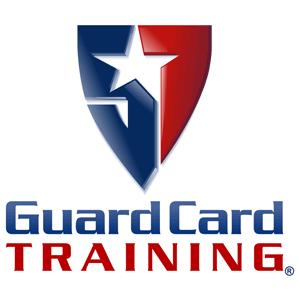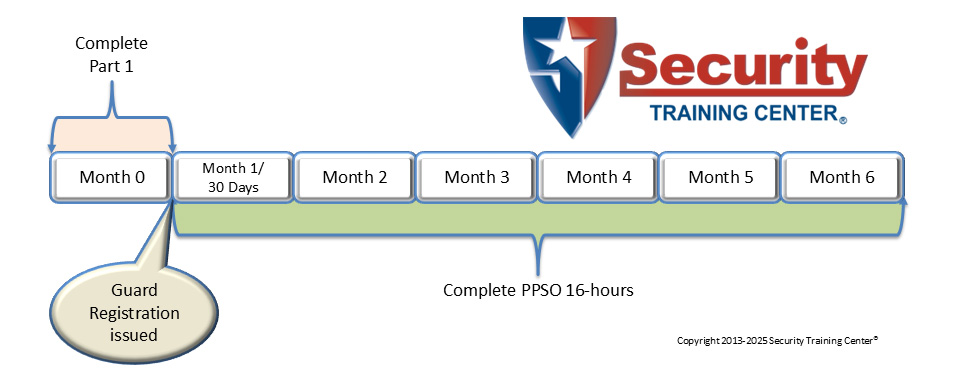
California BSIS Proprietary Private Security Officer (PPSO Card) Online Training
$31.99 16-Hours BSIS PPSO Card Training Class
This coursework must be completed after the "Powers to Arrest and Appropriate Use of Force" class (Part 1). This coursework represents the remaining 16-hours of the mandatory 24-hours of training.
NOTE: The lessons must be taken in order.
Training Requirements1
To be completed prior to obtaining a PSO license (minimum of 8 hours):
- Power to Arrest (3 hours); and
- Appropriate Use of Force (minimum of 5 hours)
To be completed within 6 months from the date PSO registration is approved (minimumof 16 hours):
- Mandatory Outline of Courses (minimum of 16 hours)
To be completed annually (minimum of 8 hours):
A registered Proprietary Private Security Officer must complete a minimum of eight (8) hours of continuing education and must include a minimum of two (2) hours of review of the appropriate use of force topics as set forth in section I.B. of the Appendix (CCR 643). Mandatory and Elective courses shall be used to meet the remaining annual training hours. Please note, your employer is required by law to provide this training.
Pursuant to Business and Professions Code (BPC) Section 7574.18 and California Code of Regulations Title 16, Division 7, Section 643, the institution or company providing the training is required to provide you with a Certificate of Completion after successfully completing the training. The Bureau strongly recommends that you retain a copy of all Certificates of Completion for your records.
Overdue Courses
Students have 90-days (3-months) to complete the course. Once a course is marked "Overdue" access to the course is removed, no extensions are given, and no refunds apply.
- Complete this course AFTER completing the Part 1, Powers to Arrest and Appropriate Use of Force.
Online Course Completion
Certificate of Completion:
- Certificate of Completion.
Downloadable from the Transcripts page.
| Course | Price | Buy | Login |
|---|---|---|---|
| 16-hrs, Proprietary Private Security Officer (PPSO Card) | $31.99 | ||
| Annual BSIS Continuing Education (8-hours) | $23.99 |
California Proprietary Private Security Officer (PPSO Card) Training Timelines
You may stand post after an 8-hours course and receiving your PPSO Card from the State of California, BSIS. Afterwards, you have 180-days (6-months) to complete 16-hours of additional required training.

Proprietary Private Security Officer (PPSO Card) Coursework
California BSIS Proprietary Private Security Officer (PSO) is a 16-hours program. This section familiarizes and instructs the student in basic skills and provides a common body of knowledge in the performance of security guard work delineated by Business and Professions Code Section 7583.6 (b).
This section must be completed within 6-months from the day the guard's registration card is issued or the day the guard begins employment.
This course is comprised of five (5) lessons:
Cost: $31.99
Public Relations (Community & Customer)
Objectives:
- Recognize and avoid gender and racial harassment.
- Recognize and avoid discrimination.
- Understand and develop respect of others.
- Apply appropriate verbal skills and crisis intervention.
- Understand diversity.
- Understand the implications of substance abuse and how they apply to workplace security.
- Understand the code of ethics and proper code of conduct.
- Present a professional appearance and presence.
- Complete the Public Relations Final Exam with a 100% score in accordance with regulations.
Subjects
- Discrimination and Sexual Harassment.
- Verbal Skills and Crisis Intervention.
- Substance Abuse.
- Ethics and Professionalism.
Observation and Documentation
Objectives:
- Write an effective report
- Take descriptive and useful field notes.
- Properly employ all senses in observation.
- Conduct an efficient and productive patrol.
- Conduct a thorough area search.
- Conduct an appropriate interview.
- Complete the Observation and Documentation Final Exam with a 100% score in accordance with regulations.
Subjects
- Report Writing
- Observation and Patrol Techniques
- Asking Questions and Observing Suspects
Communication and its Significance
Objectives:
- Understand the importance of effective internal and external communication.
- Understand the importance of reading and understanding Post Orders.
- Recognize the need for confidentiality of protocols and contact information.
- Know the basic information to collect in an emergency.
- Be able to make a direct and efficient call for assistance.
- Understand the common types of communication systems.
- Be able to effectively use common communication systems.
- Complete the Communication and its Significance Final Exam with a 100% score in accordance with regulations.
Subjects
- Internal Protocols
- External Protocols
Liability/Legal Aspects
Objectives:
- Understand the difference between the court proceedings and the burden of proof for criminal and civil courts.
- Understand the penalties for criminal prosecution and civil litigation.
- Understand the personal liability of security officer.
- Understand the liability of the guard company.
- Understand the liability of the client.
- Understand the criminal, civil and administrative process.
- Know and understand the BSIS Code and Regulations.
- Understand the role of the security guard.
- Complete the Liability/Legal Aspects Final Exam with a 100% score in accordance with regulations.
Subjects
- Introduction to Criminal, Civil and Administrative Courts.
- Personal, Security Firm and Site Owner Liability.
- BSIS Code and Regulations.
- Role of a Security Guard.
Fundamentals of Patroling
Objectives:
- Apply appropriate patrolling techniques and methods.
- Describe how to handle suspicious activity.
- Explain how to ask appropriate questions.
- Apply accident and fire prevention techniques.
- Properly employ all senses in observation.
- Conduct an efficient and productive patrol.
- Conduct an appropriate interview.
Subjects
Patrolling serves two purposes. First, it makes the security guard visible as rounds are made. This is a show of force and a visual deterrent to potential troublemakers. Second, it allows the security guard to inspect the property or facility, observe firsthand the facility’s condition, mingle with patrons and clients, and check the security of the perimeter and grounds.
1 BSIS Proprietary Private Security Officer Fact Sheet; rev. March 2025.
Information provided on this site is educational. It is not legal advice. Training does not guarantee licensing or employment.
